Vera Wentworth
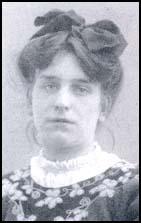
Jessie Alice Spink (Vera Wentworth), the daughter of Harry Laing Spink and Rachel Amanda Goode, was born in Westminster, London, on 14th March 1893. Her father was according to Census returns a "Chemist & Druggist". Her mother died when she was a child and her father married Louisa Hawkins. (1)
Jessie seems to have rebelled against her father and became close to her brother Wilfred William Spink, who became a member of the Independent Labour Party (ILP) and a devoted follower of Keir Hardie. Spink introduced Jessie to Fenner Brockway, a socialist, pacifist and a campaigner for women's rights. (2)
Brockway later argued: "The women's suffrage movement... had my enthusiasm hardly less than the Socialist movement. When the National Union of Women's Suffrage Societies threw in its lot with the Labour Party, and particularly with the ILP, I spoke at their meetings frequently and took part in a number of their by-election campaigns." (3)
After leaving school she found work in a shop. She was an active trade unionist and her brother, who was only 18 years old and working as a journalist, was the leader of an unsuccessful unofficial strike of women workers in the East End of London. Brockway described "Wilfie Spinks" as his "explosive friend." (4)
Vera Wentworth and WSPU
Jessie joined the Women's Social and Political Union (WSPU) in 1906. The following year she changed her name to Vera Wentworth. Possibly because her father, a successful businessman, did not want her to use the family name. (5) She now became an avid supporter of Christabel Pankhurst. She showed this by wearing a badge with her portrait on her chest. (6)
Wentworth was first arrested after taking part in a demonstration outside the House of Commons in February 1908. She was sentenced to six weeks imprisonment. On her release she met fellow suffragettes, including Mary Blathwayt at the Eustace Miles Restaurant. At another demonstration on 30th June, 1908, she was arrested and sentenced to three-months' imprisonment. On her release from Holloway Prison she published an article, "Should Christian Women Demand the Vote", for the September edition of the Christian Commonwealth. She also published an article, "Three Months in Holloway" on her experiences in prison. (7)
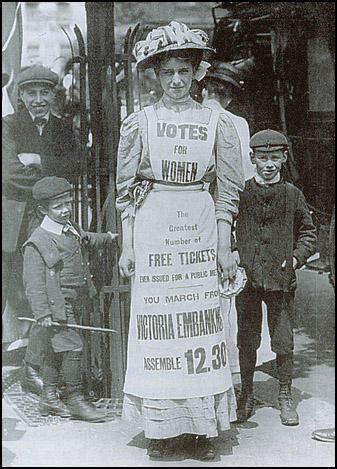
In December 1908 Wentworth became a WSPU organiser and joined Minnie Baldock, Jessie Kenney, Charlotte Marsh, and Mary Phillips in their work in London. Wentworth was based in Brixton and according to Votes for Women she organised open-air meetings outside the Kennington Theatre and in local shopping districts. (8)
In January 1909 Wentworth moved to Bristol where she helped Clara Codd organise the WSPU in the city. One of their main targets was Augustine Birrell, the Liberal MP for Bristol North. It was reported: "On Tuesday Miss Vera Wentworth and Miss Clara Codd had a good meeting at the Horse Fair. On Wednesday we had a fine meeting for women in Mr. Birrell's constituency (Bristol North) most of those present being of the hard-working class; their response to our explanation for the vote was most encouraging… Miss Vera Wentworth and Miss Clara Codd took the Stokes Croft At Home this week, and Miss Wentworth has organised a "Votes Corps," which goes out on Monday evening…. Helpers who can give some time to this excellent propaganda work please write to Miss Vera Wentworth, 33 Queen Road, Clifton. Miss Wentworth is also organising chalking parties for advertising our open-air meetings." (9)
Young Hot Bloods
Around this time Vera Wentworth volunteered to join a secret group called Young Hot Bloods to carry out acts that would probably result in them being sent to prison. No married women were eligible for membership and they had to pledge to "danger duty". (10) It has been argued that this group included Helen Craggs, Olive Hockin, Kitty Marion, Lilian Lenton, Miriam Pratt, Norah Smyth, Clara Giveen, Eileen Casey, Hilda Burkitt, Mary Leigh, Gladys Evans, Olive Wharry, Jessie Kenney, Elsie Howey, Mary Phillips and Florence Tunks. (11)
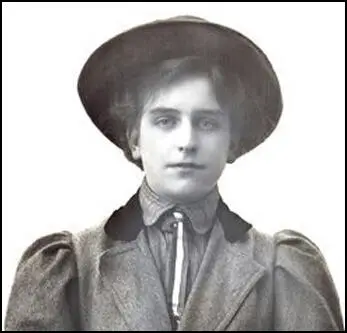
In February 1909, Jessie Kenney and Minnie Baldock moved to Bristol with the intentions of increasing militant actions in the city. Meetings were held regularly in the open-air on the Downs, the Horse Fair, on Horfield Common, as well as outside factories. In May 1909, Wentworth and Elsie Howey hid in Colston Hall's organ in order to interrupt, with the cry of "votes for women", a meeting being held by Augustine Birrell, the Liberal MP for Bristol North. (12)
In July 1909 Vera Wentworth, Elsie Howey and Mary Phillips volunteered to take part in a militant demonstration in Exeter at a meeting being held by Charles Robert Wynn-Carington, 3rd Baron Carrington, a member of the Liberal government. The three women were arrested and after refusing to pay the fine imposed on them they were sent to prison. While in prison they all went on hunger strike. (13)
Mary Blathwayt
Vera Wentworth was a regular visitor to the home of Colonel Linley Blathwayt. His wife, Emily Blathwayt, and his daughter, Mary Blathwayt, held progressive political views and were both advocates of women's suffrage. Colonel Blathwayt was sympathetic to the WSPU cause and Eagle House, on the outskirts of Bath, that was called the "Suffragette Rest". Colonel Blathwayt photographed the WSPU visitors. These were then signed and sold at WSPU bazaars. Members of the WSPU who endured hunger strikes went to stay with the family. Colonel Blathwayt also designed an arboretum which was planted with trees by suffragette ex-prisoners. Eventually, fifty-four trees with their accompanying plagwere established there. (14)
Mary Blathwayt recorded in her diary that Annie Kenney had intimate relationships with at least ten members of the WSPU at Batheaston. Blathwayt records in her diary that she slept with Annie in July 1908. Soon afterwards she illustrated jealousy with the comments that "Miss Browne is sleeping in Annie's room now." The diary suggests that Annie was sexually involved with both Christabel Pankhurst and Clara Codd. Blathwayt wrote in her diary that "Miss Codd has come to stay, she is sleeping with Annie." (15) Codd's autobiography, So Rich a Life (1951) confirms this account. (16)
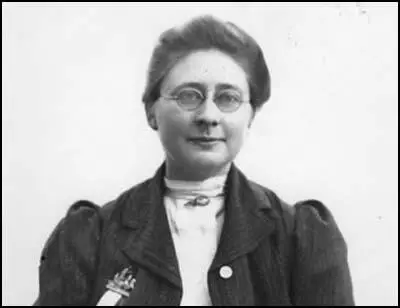
During this period Vera Wentworth developed an intimate relationship with Mary Blathwayt. The historian, Martin Pugh, points out that "Mary writes matter-of-fact lines such as, Annie slept with someone else again last night, or There was someone else in Annie's bed this morning. But it is all done with no moral opprobrium for the act itself. In the diary Kenney appears frequently and with different women. Almost day by day Mary says she is sleeping with someone else." (17)
Attacks on Herbert Asquith
A team of suffragetts led by Jessie Kenney and including Vera Wentworth, Mary Phillips and Elsie Howey, decided to target the prime minister, Herbert Asquith. There first incident took place in August 1909. Howey said in court: "We wish to say we don't think we are the guilty parties. We did obstruct the police, but we were only performing our duty. The Liberal Government is directly responsible for this. We have tried again and again to get Mr Asquith to see a deputation and explain what we want, but he will not see our deputations. Therefore, we must go to work differently. We have warned him that other things may happen if he will not listen to us. If we do not worse things it is not because we are afraid, but because we do not want to hurt anyone." (18)
The level of violence used by the women shocked Mary Blathwayt. She wrote in her diary: "We hear of terrible things by the two Hooligans we know, Vera and Elsie and there is a Kenney in it. They made a regular raid on Mr. Asquith breaking a window and using personal violence. Then missiles have been thrown lately through windows during Cabinet Members meetings which might injure or kill innocent persons." (19)
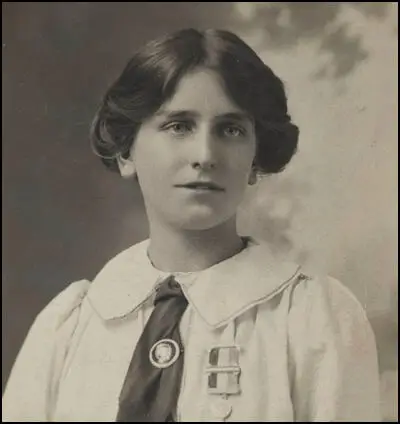
The following month they decided to visit Asquith when he was spending the weekend with Herbert Gladstone, his home secretary, at Lympne Castle. Kenney wrote about this in Votes for Women: "Vera Wentworth, Elsie Howey an I arranged our plans accordingly, and we decided to go down, too, and remind Mr. Asquith... that he would not have much peace until he did his duty to the women of the country. On Sunday morning we disguised ourselves ready for the occasion. Miss Vera Wentworth disguise as a nurse being especially successful. We took a boat up the Military Canal, which runs just below the Castle grounds, and moored it almost facing the Castle."
It was decided to accost Asquith when he went to church on Sunday morning. "We then went up to the churchyard, whence we could command a good view of both of the Castle gates and the entrance of the church. We had not been there very long when we saw Mr Asquith making his way into church, so we waited until the service was over. As he was going from the church to the little door which led to the Castle we hastened up towards him, and he began to run. He was just slipping through the door when we caught him. He got wedged in the door, and a struggle ensued, in which his hat was knocked off. He tried to recover both his hat and his dignity, but looked extremely afraid. Mr Asquith, I think, quite understood the position as we had warned him at Clovelly that the women were not going to tolerate his attitude to them much longer. It was a real "Deeds not words" affair. Not a word was spoken on either side. Mr Asquith managed to squeeze through by the aid of someone who came to his help, and the door was shut." (20)
Herbert Asquith later recalled: "The contest was very evenly balanced... The women outside obviously meant business; they succeeded in prising the doors a short distance apart and while he stood spread-eagled in front of them with a hand on each door, one of them inserted herself in the crevice between and began butting him in the diaphragm with her head." Herbert Asquith junior got hold of her wrist and she fought with "a strange demonic frenzy which I had never met and hope never to see again." (21)
That afternoon they decided to attack Asquith when he played golf with Gladstone at Littlestone-on-Sea. "We saw him quietly descending the steps, and making his way down the footpath to the motor- Miss Howey then made a dash up the path, and as soon as he saw her coming, he turned round and ran back again, and was almost on the top step when she caught him. He then said to Miss Howey, 'I shall have you locked up,' but she promptly returned, 'I don't care what you do, Mr. Asquith!' Vera Wentworth, and I then followed, and his hat was thrown off again in the scrimmage. When we arrived on the scene, Mr. Asquith was calling for help and trying to push Miss Howey out of the porch. At the call of Mr. Asquith, Mr. Gladstone came on the scene, and a real fight ensued. Mr. Gladstone and Mr. Asquith tried to push us down the steps, but we pushed back as hard as they pushed forward. Mr Gladstone fought like a prize fighter, and struck out left and right. I must say he is a better fighter than he is a politician!" (22)
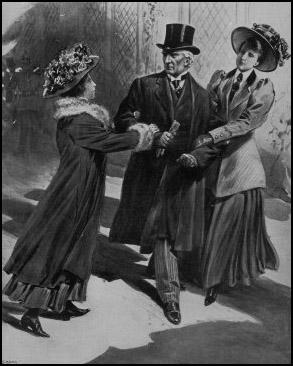
The women were arrested and appeared in court accused of assaulting Asquith and Gladstone. (23) Emily Blathwayt sent a letter to the WSPU headquarters: "Dear Madam, with great reluctance I am writing to ask that my name may be taken off the list as a Member of the W.S.P.U. Society. When I signed the membership paper, I thoroughly approved of the methods then used. Since then there has been personal violence and stone throwing which might injure innocent people. When asked by acquaintances what I think of these things I am unable to say that I approve, and people of my village who have hitherto been full of admiration for the Suffragettes are now feeling very differently." (24)
Colonel Linley Blathwayt wrote to Christabel Pankhurst complaining about the behaviour of Vera Wentworth and Elsie Howey and suggested that they would no longer be welcome at Eagle House. Colonel Blathwayt also wrote letters to Wentworth and Howley about their behaviour. He said that "an attack on one undefended man by three women was an act I did not expect from the Society". According to Emily Blathwayt, they received a "long letter from Vera Wentworth who is very sorry we are grieved but if Mr. Asquith will not receive deputation they will pummel him again."
Mary Blathwayt wrote in her diary: "Vera Wentworth sent Linley a tardy acknowledgement of the photo he sent and hopes he was not shocked at their punching Asquith's head. I am writing back coldly, saying how grieved he is at the late actions and the stone throwing; telling how I was obliged to leave as I could no longer 'approve the methods' and finishing 'An attack on one undefended man by three women was an act I did not expect from the Society'. Last time Vera and Elsie left here I promised myself they should never come again if it were only on account of the reckless destruction of other people's property." (25)
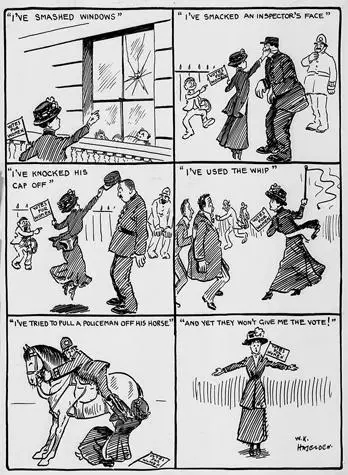
Colonel Blathwayt also wrote letters to Wentworth and Howley about their behaviour. He said that "an attack on one undefended man by three women was an act I did not expect from the Society". Emily Blathwayt, received a "long letter from Vera Wentworth who is very sorry we are grieved but if Mr. Asquith will not receive deputation they will pummel him again." Wentworth added "the authorities knew nothing of the raid for which they alone are responsible. They are driven nearly mad by the unjust treatment all their dear women have received and she points out they did no serious harm to Asquith whereas Herbert Gladstone gave Jessie a nasty blow in the chest." (26)
Militant Suffragette
On their release were met at the gates of Holloway Prison and then drawn by 50 women on a carriage to Queen's Hall. On their arrival they were presented with bouquets in the suffragette colours and with illuminated scrolls designed by Sylvia Pankhurst to commemorate their imprisonment. Wentworth was again arrested in November 1909 for breaking windows of the Liberal Club in Bristol where Winston Churchill had a speaking engagement. She went on hunger strike and was forcibly fed. (27)
Emmeline Pankhurst was furious at what she saw as Asquith's betrayal and on 18th November, 1910, arranged to lead 300 women from a pre-arranged meeting at the Caxton Hall to the House of Commons. Pankhurst and a small group of WSPU members, were allowed into the building but Asquith refused to see them. Women, in "detachments of twelve" marched forward but were attacked by the police. (28)
Votes for Women reported that 159 women and three men were arrested during this demonstration. (6) This included Vera Wentworth, Cecilia Wolseley Haig, Ada Wright, Catherine Marshall, Eveline Haverfield, Anne Cobden Sanderson, Mary Leigh, Vera Holme, Louisa Garrett Anderson, Kitty Marion, Gladys Evans, Maud Arncliffe Sennett, Clara Giveen, Eileen Casey, Patricia Woodcock, Vera Wentworth, Mary Clarke, Lilian Dove-Wilcox, Minnie Turner, Lucy Burns, Grace Roe and Henria Williams. (29)
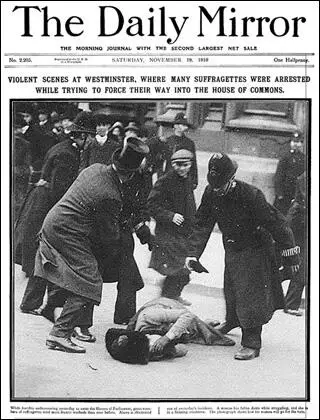
Sylvia Pankhurst later described what happened on what became known as Black Friday: "As, one after the other, small deputations of twelve women appeared in sight they were set upon by the police and hurled aside. Mrs Cobden Sanderson, who had been in the first deputation, was rudely seized and pressed against the wall by the police, who held her there by both arms for a considerable time, sneering and jeering at her meanwhile.... Just as this had been done, I saw Miss Ada Wright close to the entrance. Several police seized her, lifted her from the ground and flung her back into the crowd. A moment afterwards she appeared again, and I saw her running as fast as she could towards the House of Commons. A policeman struck her with all his force and she fell to the ground. For a moment there was a group of struggling men round the place where she lay, then she rose up, only to be flung down again immediately. Then a tall, grey-headed man with a silk hat was seen fighting to protect her; but three or four police seized hold of him and bundled him away. Then again, I saw Miss Ada Wright's tall, grey-clad figure, but over and over again she was flung to the ground, how often I cannot say. It was a painful and degrading sight. At last, she was lying against the wall of the House of Lords, close to the Strangers' Entrance, and a number of women, with pale and distressed faces were kneeling down round her. She was in a state of collapse." (30)
Several women reported that the police dragged women down the side streets. "We knew this always meant greater ill-usage.... The police snatched the flags, tore them to shreds, and smashed the sticks, struck the women with fists and knees, knocked them down, some even kicked them, then dragged them up, carried them a few paces and flung them into the crowd of sightseers." (31)
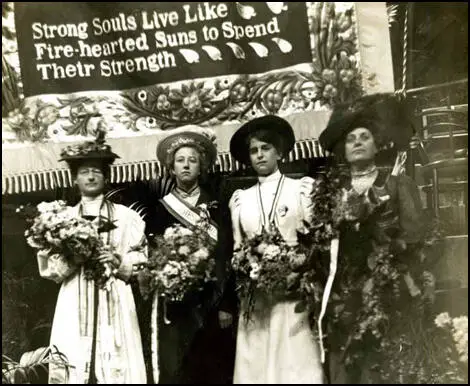
After her release from prison Vera Wentworth began attending classes in General Modern History and General Political Economy at St Andrews University. She also wrote An Allegory, that was published in by the Actresses' Franchise League. In March 1913 the play was directed by Emmeline Pethick-Lawrence and performed by WSPU prisoners in Holloway Prison. (32)
First World War
The British government declared war on Germany on 4th August 1914. Two days later, Millicent Fawcett, the leader of the NUWSS declared that the organization was suspending all political activity until the conflict was over. Fawcett supported the war effort but she refused to become involved in persuading young men to join the armed forces. This WSPU took a different view to the war. It was a spent force with very few active members. According to Martin Pugh, the WSPU were aware "that their campaign had been no more successful in winning the vote than that of the non-militants whom they so freely derided". (33)
The WSPU carried out secret negotiations with the government and on the 10th August the government announced it was releasing all suffragettes from prison. In return, the WSPU agreed to end their militant activities and help the war effort. Christabel Pankhurst, arrived back in England after living in exile in Paris. She told the press: "I feel that my duty lies in England now, and I have come back. The British citizenship for which we suffragettes have been fighting is now in jeopardy." (34)
After receiving a £2,000 grant from the government, the WSPU organised a demonstration in London. Members carried banners with slogans such as "We Demand the Right to Serve", "For Men Must Fight and Women Must Work" and "Let None Be Kaiser's Cat's Paws". At the meeting, attended by 30,000 people, Emmeline Pankhurst called on trade unions to let women work in those industries traditionally dominated by men. She told the audience: "What would be the good of a vote without a country to vote in!". (35)
Final Years
Vera Wentworth appears to have lost interest in politics after the WSPU became the The Women's Party. After the First World War she lived with Daisy E Carden, who received B.A. degree from University of London in 1927. By 1939 they were living at 47 Argyle Square, St Pancras, London. Wentworth described herself as an "Authoress", Carden is recorded as a "Clerk " at "Middlesex Hospital " (36)
During the Second World War she worked in London in the Air Raid Precautions. (37)
Vera Wentworth died in the Elizabeth Garrett Anderson Hospital on 5th August 1957. (Home address: 2 White Heather House, Cromer Street, London WC1).
Primary Sources
(1) Votes for Women (10th December 1908)
The following organisers are now at work in London; Mrs Baldock, Miss Jessie Kenney. Miss Ogston, Miss Marsh, Miss Vera Wentworth, Miss Mary Phillips, Miss Gye…
Miss Vera Wentworth is helping in Brixton, where a meeting will be held tomorrow (Friday 11th December)… Open-air meetings outside the Kennington Theatre and in the shopping districts have been held this week.
(2) Votes for Women (28 January 1909)
On Tuesday Miss Vera Wentworth and Miss Clara Codd had a good meeting at the Horse Fair. On Wednesday we had a fine meeting for women in Mr. Birrell's constituency (Bristol North) most of those present being of the hard-working class; their response to our explanation for the vote was most encouraging…
Miss Vera Wentworth and Miss Clara Codd took the Stokes Croft At Home this week, and Miss Wentworth has organised a "Votes Corps," which goes out on Monday evening…. Helpers who can give some time to this excellent propaganda work please write to Miss Vera Wentworth, 33 Queen Road, Clifton. Miss Wentworth is also organising chalking parties for advertising our open-air meetings.
(3) Emily Blathwayt, diary entry (31st July, 1909)
Elsie Howey, Vera Wentworth and Mary Phillips were arrested at Exeter and imprisoned for a week and it is said they are going through the hunger strike as the 14 have done. The crowds were with them outside Lord Carrington's meeting and all resisted police and two working men were arrested. The women would not pay the fine. Annie Kenney expects to be taken soon herself, and asked Mary to go and manage for her in Bristol.
(4) The Torquay Times (6th August 1909)
On Saturday three Suffragettes – Misses Rose Elsie N. Howey, who is well-known at Torquay, Vera Wentworth and May Elizabeth Phillips – were charged with obstructing the police outside a meeting, which was addressed by Earl Carrington, on the previous evening. They were each fined forty shillings on 7 days' imprisonment. They decided to go to prison. Miss Howey, addressing the justices, said: -
"We wish to say we don't think we are the guilty parties. We did obstruct the police, but we were only performing our duty. The Liberal Government is directly responsible for this. We have tried again and again to get Mr Asquith to see a deputation and explain what we want, but he will not see our deputations. Therefore, we must go to work differently. We have warned him that other things may happen if he will not listen to us. If we do not worse things it is not because we are afraid, but because we do not want to hurt anyone. We are political prisoners, and claim to be treated as such in the First Division. Otherwise, we shall refuse to keep the prison regulations.
(5) Emily Blathwayt, diary entry (7th September, 1909)
Linley and I went in pouring rain to the Tollemaches who had a tent beyond their house and Mr. Laurence Housman gave a very good address on Women's Suffrage... The lecturer said he could not say anything against militant methods as the women had been driven to it by the non-action of the men. I cannot feel quite the same. We hear of terrible things by the two Hooligans we know, Vera and Elsie and there is a Kenney in it. They made a regular raid on Mr. Asquith breaking a window and using personal violence. Then missiles have been thrown lately through windows during Cabinet Members meetings which might injure or kill innocent persons.
(6) Emily Blathwayt, diary entry (8th September, 1909)
This morning I posted the following to the Sec. 4 Clement's Inn. "Dear Madam, with great reluctance I am writing to ask that my name may be taken off the list as a Member of the W.S.P.U. Society. When I signed the membership paper, I thoroughly approved of the methods then used. Since then there has been personal violence and stone throwing which might injure innocent people. When asked by acquaintances what I think of these things I am unable to say that I approve, and people of my village who have hitherto been full of admiration for the "Suffragettes" are now feeling very differently. I shall continue to do what I can to help, but I cannot conscientiously say now that I approve the methods used by several of the members... Later on Linley wrote to Christabel Parkhurst expressing something of the same views and he said how could he again be seen driving Elsie and Vera. They seem to have behaved very badly.
(7) Jessie Kenney, Votes for Women (10th September 1909)
Having ascertained that Mr Asquith would be going to Lympne, this weekend, Vera Wentworth, Elsie Howey an I arranged our plans accordingly, and we decided to go down, too, and remind Mr. Asquith, as we did at Covelly (only more forcibly), that he would not have much peace until he did his duty to the women of the country.
On Sunday morning we disguised ourselves ready for the occasion. Miss Vera Wentworth disguise as a nurse being especially successful. We took a boat up the Military Canal, which runs just below the Castle grounds, and moored it almost facing the Castle…
We then went up to the churchyard, whence we could command a good view of both of the Castle gates and the entrance of the church. We had not been there very long when we saw Mr Asquith making his way into church, so we waited until the service was over. As he was going from the church to the little door which led to the Castle we hastened up towards him, and he began to run. He was just slipping through the door when we caught him. He got wedged in the door, and a struggle ensued, in which his hat was knocked off. He tried to recover both his hat and his dignity, but looked extremely afraid. Mr Asquith, I think, quite understood the position as we had warned him at Clovelly that the women were not going to tolerate his attitude to them much longer. It was a real "Deeds not words" affair. Not a word was spoken on either side. Mr Asquith managed to squeeze through by the aid of someone who came to his help, and the door was shut…
That was only the beginning of our campaign. We made our plans all ready for the afternoon and we decided that we would try and catch Mr. Asquith and Mr. Gladstone together at Littlestone-on-Sea, a small seaside village some miles from Lympne, as we ha a good idea that they would golf together that afternoon.
Soon we saw him quietly descending the steps, and making his way down the footpath to the motor- Miss Howey then made a dash up the path, and as soon as he saw her coming, he turned round and ran back again, and was almost on the top step when she caught him. He then said to Miss Howey, "I shall have you locked up," but she promptly returned, "I don't care what you do, Mr. Asquith!" Vera Wentworth, and I then followed, and his hat was thrown off again in the scrimmage. When we arrived on the scene, Mr. Asquith was calling for help and trying to push Miss Howey out of the porch. At the call of Mr. Asquith, Mr. Gladstone came on the scene, and a real fight ensued. Mr. Gladstone and Mr. Asquith tried to push us down the steps, but we pushed back as hard as they pushed forward. Mr Gladstone fought like a prize fighter, and struck out left and right. I must say he is a better fighter than he is a politician!
(8) Emily Blathwayt, diary entry (12th September, 1909)
Have sent a cutting to Christabel and told her about my personal observation of Vera Wentworth and Elsie Howley. If she allows them to go on any more raids she has been warned. Linley is writing to Annie Kenney and appeals to her to do nothing violent.
(9) Emily Blathwayt, diary entry (14th September, 1909)
Vera Wentworth sent Linley a tardy acknowledgement of the photo he sent and hopes he was not shocked at their punching Asquith's head. I am writing back coldly, saying how grieved he is at the late actions and the stone throwing; telling how I was obliged to leave as I could no longer "approve the methods" and finishing "An attack on one undefended man by three women was an act I did not expect from the Society". Last time Vera and Elsie left here I promised myself they should never come again if it were only on account of the reckless destruction of other people's property.
(10) Emily Blathwayt, diary entry (16th September, 1909)
Long letter from Vera Wentworth who is very sorry we are grieved but if Mr. Asquith will not receive deputation they will pummel him again. She says the authorities knew nothing of the raid for which they alone are responsible. They are driven nearly mad by the unjust treatment all their dear women have received and she points out they did no serious harm to Asquith whereas Herbert Gladstone gave Jessie a nasty blow in the chest. She also says what the liberal stewards have done at the meetings to the women. She really believes she is acting quite rightly. The letter needs no reply.
(11) Mary Blathwayt, diary entry (13th November, 1909)
Last night at a little past one in the morning, Miss K. Brown arrived at this house in a taxi; I heard the taxi and opened the door and let her in. Annie and Elsie Howey were up and about all night in the town. This morning we went down to the police court. Vera Wentworth, Miss Pitman and Mary Allen were all tried. Vera Wentworth and Mary Allen each have 14 days in the 2nd division. As Miss Pitman did much more damage, about £15 to the Post Office windows, she will be tried by jury next Wednesday. Miss Garnett has hit Mr. Churchill across the face with a horsewhip at the station, and knocked his hat about. Miss Law has broken a window in the Colston Hall. There is a great crowd outside the Colston Hall tonight
(12) The Manchester Courier (13th December 1909)
Miss Vera Wentworth the Suffragette who was recently released from prison, attempted to approach Mr Birrell, at Bristol Station, on Saturday, but was prevented by detectives.
(13) David Simkin, Family History Research (3rd August, 2020)
Jessie Alice Spink (Vera Wentworth)
Birth Registered 2nd Qtr (April-May-June) 1890 in the district of St George Hanover Square, London. Place of birth: St Margaret's parish, Westminster .
On the 1939 Register Vera Wentworth gives her date of birth as 14th March 1893 - so possibly born 14th March 1890.
Death 5th August 1957 Vera Wentworth died at the Elizabeth Garrett Anderson Hospital, London (Home address: 2 White Heather House, Cromer Street, London WC1)
Father: Harry Laing Spink Chemist & Druggist (1866–1927)
Birth 13 January 1866 - St Margaret and St John the Evangelist Westminster, London, England
Death 15 April 1927 - Hemel Hempstead, Hertfordshire, EnglandMother: Rachel Amanda Goode 1868–??
Birth 28 January 1868 � St Pancras, Middlesex, England
Married Harry Laing Spink in 1886
Death: Unknown but died or divorced before 1906, the year Harry Laing Spink remarried. 2nd wife Louisa Hawkins (born 1874- died 1920)Harry Laing Spink married again in 1920 - 3rd wife Lilian Phoebe Jones.
Her brother Wilfred William Spink (born 1887, Battersea, London) reputedly said that his sister changed her name " on the orders of their father, so that the family name wasn't brought into disrepute. The Spinks were wealthy established chemists in Holborn and Westminster, London, and their name carried weight ".
Wilfred William Spink aka William Wilfred Spink (1887–1970) aka Wilfrid Spink
Birth 9 March 1887 - Battersea, London, London, EnglandDied: 1970 10 July 1970 Bournemouth
On the 1911 Census Form, Vera's brother is recorded as " Wilfred Wentworth Spink ", a "Commercial Traveller " aged 25 (He would have been 24 at the time).
By 1939 he was divorced from his Danish wife. On the 1939 Register, Wifrid W. Spink (born 9th March 1887) is described as a "Journalist" .
Wilfrid W Spink
Birth Date: 9 Mar 1887
Residence Date: 1939
Address: 'Craigsted', Marple, Cheshire, England
Occupation: JournalistServed in Royal Air Force during WW1 (Airmen Records)
Service Date 11 Nov 1914
Service Number 2208
Spouse Stella Carla Spink formerly Stella Carla Winifred Grundtvig (1889–1976)
Birth 1 June 1889 � Copenhagen, DenmarkMarried 23rd December 1911, Holborn. Spouse William Wilfred Spink [ divorced between 1921 and 1933 ]
Stella married 2nd husband Herbert Luke in 1951
Death 7 December 1976 � Colwyn, Clwyd, WalesWilfred William Spink married Szojszana ("Suzy") Feldman in Leeds in 1933.
Wilfred William Spink died on 10th July 1970 at Bournemouth
From 1939 Vera lived with Daisy Ethel Carden (1896–1992)
On the 1939 Register Vera Wentworth and Daisy Carden are shown living together. Vera gives her date of birth as 14th March 1893 (actually born 1890) They were living at 47 Argyle Square, St Pancras, London .
Vera Wentworth is described as an "Authoress", Daisy E. Carden (date of birth 30th March 1896) is recorded as a "Clerk " at "Middlesex Hospital ".
Daisy Ethel Carden
Birth 30 March 1896 � New Barnet, Hertfordshire, England
Death: 7 August 1992 - HampsteadDaisy's father: Edward Thomas Carden (1865–1902). In 1901, Edward T. Carden recorded as a " Chartered Accountant "
Daisy E. Carden recorded with B.A. degree from University of London (Source Universiry of London Calendar, 1927 )Vera Wentworth died on 5th August 1957, aged 67, at the Elizabeth Garrett Anderson Hospital, London.

